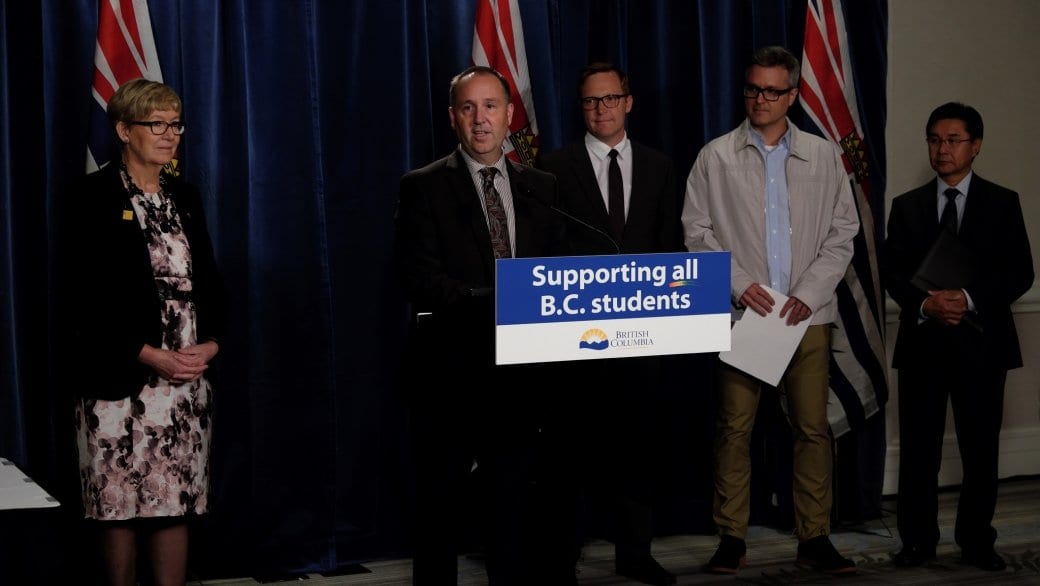Every school district in British Columbia must add explicit protections for LGBT students to their anti-bullying policies by the end of 2016, provincial education minister Mike Bernier announced Sept 8, 2016.
Bernier says all schools — including independent schools — must now pass policies “with clauses that specifically reference sexual orientation and gender identity.”
“All of BC’s schools need to be welcoming and safe places free of bullying,” he says in a press release. “We owe it to our children to make sure they know that there are no reasons they should be bullied — and including sexual orientation and gender identity in anti-bullying policies makes that crystal clear.”
The sudden announcement comes after more than a decade of gay education activists pushing the government to take leadership — while the BC Liberals insisted that queer students were already adequately protected.
“Everybody is respected and welcomed in BC schools, regardless of their gender, race, culture, religion, sexual orientation, or gender identity,” the education ministry reiterated to Daily Xtra in January 2016, after a study of teachers’ experiences in Canadian K-12 schools suggested BC was lagging in LGBT-inclusive education.
At the time, the ministry repeated its support for school boards that voluntarily implemented LGBT policy, and pointed to its ERASE Bullying strategy to train teachers to proactively recognize threats. But the bullying strategy never specifically mentioned LGBT students. And only two-thirds of BC’s 60 public school districts passed LGBT policy without government direction.
Now, the ministry says, it intends to bring all school district policies in line, following on its decision to add gender identity and expression to the BC Human Rights Code in July.
“We want to build on that announcement,” Bernier told a news conference.
By the end of 2016, public schools must have codes of conduct that spell out the prohibited grounds of discrimination set out in the BC Human Rights Code, plus consequences for unacceptable behaviour, the ministry says. And independent schools must have their own policies promoting safety, respect and acceptance of all students.
“We need to do better,” Bernier says.
“We won,” gay Vancouver-West End MLA Spencer Chandra Herbert tells Daily Xtra.
“The devil will be in the details of how it’s implemented,” he adds.
He says it’s a shame such an announcement had to wait until prior to the May 2017 election, since calls for change have been ongoing for more than a decade.
BC’s Safe Schools Task Force first documented homophobia in schools in 2003, but made no specific recommendations to deal with it.
“We’re finally getting somewhere,” Chandra Herbert says. “It’s a good thing for the kids.”
“It’s been a long time in coming,” says BC Teachers’ Federation president Glen Hansman. “The stars have aligned.”
While supports need to be put in place for school staff, the change goes a long way in dealing with districts that have been unwilling to pass their own policies, he says.
In the absence of government-mandated policy, nearly a third of BC’s public school districts have not passed such policy.
Hansman, who has advocated for a province-wide policy for years, says the changes will help BC shift school culture.
“It’s long overdue to districts that don’t have discrete sexual orientation and gender identity policies,” agrees James Chamberlain, who has been pushing for change in BC since the late 1990s, when he challenged the Surrey school board’s refusal to let him read three gay-friendly children’s books to his kindergarten class.
Chamberlain says the new government direction “raises the bar” for those school districts that have yet to voluntarily pass LGBT policy.
The new policy also puts independent schools on notice that they must support and protect LGBT youth, Chamberlain notes.
Out in Schools program coordinator Brandon Yan, who shows queer films in BC schools on a tight budget to facilitate discussions with students, welcomes the announcement.
“I don’t think anyone was expecting this,” he tells Daily Xtra.
But he wants to know what template will be put in place to ensure districts conform to a province-wide policy, and what support will be offered to teachers and administrators.
He says Out in Schools would be happy to help facilitate LGBT discussions in more schools, but that work would require more funding to reach more districts across the province.
“It’s hard to meet the demand,” he says. “We’re running thin.”

 Why you can trust Xtra
Why you can trust Xtra


